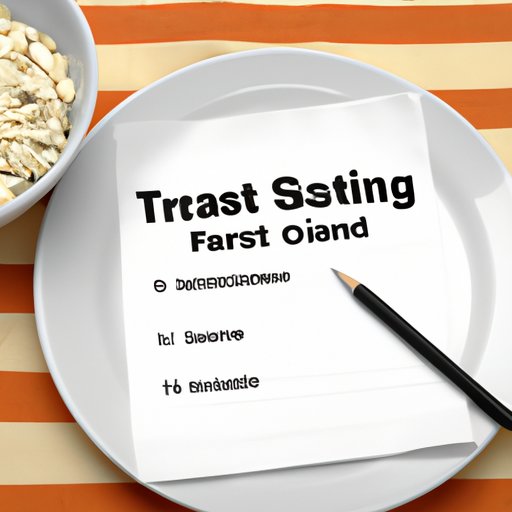
I. Introduction
If you or a loved one have been told to undergo a stress test, you may be wondering how to properly prepare. A stress test is a non-invasive medical test used to measure how well your heart responds to physical exertion. This type of test is typically ordered if you have a history of heart disease or if you have been experiencing symptoms such as chest pain or shortness of breath.
While stress tests are generally safe, they are an important medical tool that requires proper preparation. In this article, we will explore the rules of fasting and eating before your stress test to ensure you are ready for your next appointment.
II. Prepping for Your Stress Test: Understanding the Rules of Fasting and Eating
Before your stress test, your doctor will likely provide you with specific instructions on what to avoid and what to eat. Here are some key things to keep in mind:
A. The timing of your last meal
In general, you should avoid eating or drinking anything for at least 4 hours before your stress test. This includes both food and beverages like coffee, tea, and juice. Make sure to carefully follow the fasting timeline provided by your doctor to ensure accurate results.
B. Why fasting is required for some stress tests
Fasting is required for some types of stress tests, like a nuclear stress test, in order to get accurate results. When you eat, your body takes in glucose, which can affect the way your heart responds to the stress test. By fasting before the test, doctors can get a clearer picture of your heart’s function.
III. To Eat or Not to Eat? Navigating the Gray Area of Pre-Stress Test Meals
The question of whether or not to eat before a stress test can be a tricky one. Here are some things to keep in mind:
A. The pros and cons of eating before a stress test
Eating before a stress test can help prevent low blood sugar and may make you feel more comfortable during the test. However, if you eat a large meal too close to the test, it can cause indigestion or affect your test results.
B. Who should and should not eat before a stress test
If you have a history of hypoglycemia, your doctor may recommend eating a small, light meal before your stress test to avoid low blood sugar during the test. However, if you have diabetes or are taking medications that can affect your blood sugar, your doctor will likely advise against eating before the test.
IV. Healthy Meal Ideas for Before Your Stress Test
If your doctor has given you the green light to eat before your stress test, it’s important to choose healthy, light foods that won’t disrupt your digestion or affect your test results. Here are some good options:
A. Examples of healthy pre-stress test meals
- Plain oatmeal with berries and a sprinkle of unsalted nuts
- A small baked yam with a tablespoon of almond butter
- A half of a turkey sandwich and a side salad with light vinaigrette dressing
B. Tips for meal planning before your stress test
When planning your pre-stress test meal, aim for a mix of complex carbohydrates, lean protein, and healthy fats. Avoid processed foods, sugary drinks, and caffeine. Make sure to eat at least 4 hours before your stress test to avoid indigestion, and stick to small portions to keep your stomach comfortable during the test.
V. The Impact of Food on Stress Test Results: What You Need to Know
A. How food affects your results
The food you eat before a stress test can affect your heart rate and blood pressure, which can impact your test results. Eating a large or fatty meal too close to your test can cause your heart rate to increase and your blood pressure to rise, which can make it difficult to get an accurate picture of your heart’s function.
B. The importance of accurate test results
Getting accurate stress test results is crucial for your doctor to properly diagnose and treat any underlying heart conditions. If you have been asked to fast before your test, make sure to follow your doctor’s instructions to the letter to get the most accurate results possible.
VI. Fast and Furious: How Fasting Before a Stress Test Affects Your Body
A. The effects of fasting on the body
Fasting can have both positive and negative effects on the body. On the plus side, fasting can help regulate blood sugar and cholesterol levels, and may even help improve brain function. However, fasting can also cause headaches, fatigue, and low blood sugar if not done correctly.
B. What to expect during and after the stress test
During the stress test, your doctor will monitor your heart rate and blood pressure as you walk on a treadmill or ride a stationary bike. The level of exertion will gradually increase to measure how well your heart is working. After the test, you may feel tired or sore, but most people recover quickly and can resume normal activities shortly after.
VII. Expert Advice: Doctors Weigh in on the Best Foods to Eat (and Avoid) Before Your Stress Test
A. What doctors recommend eating before a stress test
According to the Mayo Clinic, some good food options before a stress test include:
- Fruit, including berries or bananas
- Whole-grain breads or crackers
- Plain or low-fat yogurt
B. Foods to avoid before a stress test
Before your stress test, make sure to avoid:
- Caffeine
- Sugar and sugary drinks
- Fatty or fried foods
VIII. Conclusion
Proper preparation is key to a successful stress test. Fasting before the test can help ensure accurate results, but make sure to carefully follow your doctor’s instructions to avoid negative side effects. If you have been given the okay to eat before your test, choose healthy, easy-to-digest foods to keep your stomach comfortable and your test results accurate.




